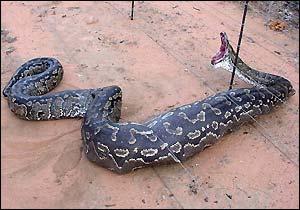I've been TAD to Kuwait and will have a recap of that trip once I return. Below are two good articles that analyze England's 7/7.
July 10, 2005
Time for stoic Brits to come out swinging
BY MARK STEYN SUN-TIMES COLUMNIST
One way of measuring any terrorist attack is to look at whether the killers accomplished everything they set out to. On Sept. 11, 2001, al-Qaida set out to hijack four planes and succeeded in seizing every one. Had the killers attempted to take another 30 jets between 7:30 and 9 that morning, who can doubt that they'd have maintained their pristine 100 percent success rate? Throughout the IRA's long war against the British Crown, two generations of politicians pointed out that there would always be the odd ''crack in the system'' through which the determined terrorist would slip. But on 9/11 the failure of the system was total.
Thursday, al-Qaida hit three London Underground trains and one bus. Had they broadened their attentions from the Central Zone, had they attempted to blow up 30 trains across the furthest reaches of the Tube map, from Uxbridge to Upminster, who can doubt that they too would have been successful? In other words, the scale of the carnage was constrained only by the murderers' ambition and their manpower.
The difference is that 9/11 hit out of the blue -- literally and politically; 7/7 came after four years of Her Majesty's government prioritizing terrorism and ''security'' above all else -- and the failure rate was still 100 percent. After the Madrid bombing, I was struck by a spate of "comic" security breaches in London: two Greenpeace guys shin up St. Stephen's Tower at the Palace of Westminster, a Daily Mirror reporter bluffs his way into a servant's gig at Buckingham Palace a week before Bush comes to stay; an Osama lookalike gatecrashes Prince William's birthday party. As I wrote last March: "History repeats itself: farce, farce, farce, but sooner or later tragedy is bound to kick in. The inability of the state to secure even the three highest-profile targets in the realm -- the queen, her heir, her Parliament -- should remind us that a defensive war against terrorism will ensure terrorism.''
To three high-profile farces, we now have that high-profile tragedy, of impressive timing. The jihad, via one of its wholly owned but independently operated subsidiaries, scheduled an atrocity for the start of the G-8 summit and managed to pull it off -- at a time when the ports and airports and internal security of a small island were all supposed to be on heightened alert.
That's quite a feat. The only good news is that the bombs were, by the standards of what's out there, small. One day they won't be.
Of course, many resources had been redeployed to Scotland to cope with elderly rocker Sir Bob Geldof's pathetic call for a million anti-globalist ninnies to descend on the G-8 summit and tie up the police with their pitiful narcissist preening: the papier-mache Bush and Blair puppets, the ersatz ethnic drumming, etc.
The choice for Britons now is whether they wish to be Australians post-Bali or Spaniards post-Madrid. That shouldn't be a tough call. But it's easy to stand before a news camera and sonorously declare that "the British people will never surrender to terrorism.'' In reality, unless it's clear a threat is primal, most democratic peoples and their political leaders prefer to regard bad news as a peripheral nuisance which can be negotiated away to the fringe of their concerns.
That's what Britain thought in the 1930s -- back when Hitler was slavering over Czechoslovakia, and Neville Chamberlain dismissed it as "a faraway country of which we know little." Today, the faraway country of which the British know little is Britain itself. Traditional terrorists -- the IRA, the Basque separatists -- operate close to home. Islamism projects itself long-range to any point of the planet with an ease most G-8 militaries can't manage. Small cells operate in the nooks and crannies of a free society while the political class seems all but unaware of their existence.
Did we learn enough, for example, from the case of Omar Sheikh? He's the fellow convicted of the kidnapping and beheading in Karachi, Pakistan, of the Wall Street Journal's Daniel Pearl. He's usually described as "Pakistani" but he is, in fact, a citizen of the United Kingdom, with as English a resume as you can get: born in Whips Cross Hospital, educated at Nightingale Primary School in Wanstead, the Forest School in Snaresbrook and the London School of Economics. He travels on a British passport.
Or take Abdel Karim al-Tuhami al-Majati, a senior al-Qaida member from Morocco killed by Saudi security forces in al Ras last April. One of al-Majati's wives is a Belgian citizen currently residing in Britain. In Pakistan, the jihadists speak openly of London as the terrorist bridgehead to Europe. Given the British jihadists who've been discovered in the thick of it in Afghanistan, Pakistan, India, Israel, Chechnya and Bosnia, only a fool would believe they had no plans for anything closer to home -- or, rather, "home."
Most Britons can only speculate at the degree of Islamist penetration in the United Kingdom because they simply don't know, and multicultural pieties require that they keep themselves in the dark. It's not just the British left that's been skeptical of Washington's war on terror. Former Foreign Secretary Douglas Hurd and many other Conservative grandees have been openly scornful of the Bush doctrine. Lord Hurd would no doubt have preferred a policy of urbane aloofness, such as he promoted vis-a-vis the Balkans in the early '90s. He's probably still unaware that Omar Sheikh was a Westernized non-observant chess-playing pop-listening beer-drinking English student until he was radicalized by the massacres of Bosnian Muslims.
Abdel Karim al-Tuhami al-Majati was another Europeanized Muslim radicalized by the 250,000 corpses of Bosnia. The fact that most of us were unaware of the consequences of EU lethargy on Bosnia until that chicken policy came home to roost a decade later should be sobering: It was what Donald Rumsfeld, in a remark mocked by many snide media twerps, accurately characterized as an "unknown unknown": a vital factor so successfully immersed you don't even know you don't know it.
This is the beginning of a long existential struggle. It's hard not to be moved by the sight of Londoners calmly going about their business as usual in the face of terrorism. But, if the political class goes about business as usual, that's not a stiff upper lip but a suicide cult. The question now is will the British return to the fantasy agenda of Bob Geldof or avenge their dead?
8 July 2005
WE CANNOT SURRENDER
States which shelter these killers will know no peace
By Christopher Hitchens
SOMEWHERE around London at about a quarter to nine yesterday morning, there must have been people turning on their TV and radio sets with a look of wolfish expectation.
I hope and believe that they were disappointed in what they got. There just wasn't quite enough giggle-value for the psychopath.
It must have been infernal underneath King's Cross, but above ground no panic, no screaming, no wailing and beating the air, no yells for vengeance.
I'm writing this in the early aftermath, but I would be willing to bet there will have been little or no bloody foolishness, either: no random attacks on mosques or shops or individuals. After all, devices on our buses and tubes are an open proclamation that the perpetrators don't care if they kill Muslims. Which, of course, is part of the point. When we use the weak and vague word "terrorism" we imply indiscriminate cruelty directed at civilians.
"Sadism" or "fascism" or "nihilism" would do just as nicely: all the venom that lurks just on the sub-human level of the human species.
In a tightly interwoven society, all that this poison has to do is ally itself with a certain low cunning.
People are afraid of plane crashes and of heights: in that sense 9/11 was the perfect strike on the collective unconscious. People are likewise afraid of fire and of crowded or subterranean conditions: the mind of the fascist is naturally attuned to exploit such dreads. I am guessing the planners of this coordinated atrocity hoped for more mayhem than they got, but the casualty figures are in a sense beside the point.
WE all knew this was coming, and that one day a homely and familiar name like Tavistock Square would become a synonym for barbarism. The good old red London bus, a worldwide symbol of our capital, ripped to shards in an instant.
Random and "senseless" though such violence may appear, we also all know it expresses a deadly ideology; indeed that in some ways it is that ideology.
The preachers of this faith have taken care to warn us that they love death more than we love life. Their wager is that this makes them unstoppable. Well, we shall have to see. They certainly cannot prove their point unless we assist them in doing so.
My American friends have been impressed by the composure of the Londoners they have seen on the screen: I bet London Transport runs again rather sooner than US airlines resumed flying after 9/11.
I remember living in London through the Provisional IRA bombing in the 70s. I saw the very first car-bomb explode against the Old Bailey in 1972. There was no warning that time, but after a while a certain etiquette developed.
And, even as I detested the people who might have just as soon have blown me up as anyone else, I was aware there were ancient disputes involved, and that there was a potential political solution.
Nothing of the sort applies in this case. We know very well what the "grievances" of the jihadists are.
The grievance of seeing unveiled women. The grievance of the existence, not of the State of Israel, but of the Jewish people. The grievance of the heresy of democracy, which impedes the imposition of sharia law. The grievance of a work of fiction written by an Indian living in London.
The grievance of the existence of black African Muslim farmers, who won't abandon lands in Darfur. The grievance of the existence of homosexuals. The grievance of music, and of most representational art. The grievance of the existence of Hinduism. The grievance of East Timor's liberation from Indonesian rule. All of these have been proclaimed as a licence to kill infidels or apostates, or anyone who just gets in the way.
FOR a few moments yesterday, Londoners received a taste of what life is like for the people of Iraq and Afghanistan, whose Muslim faith does not protect them from slaughter at the hands of those who think they are not Muslim enough, or are the wrong Muslim.
It is a big mistake to believe this is an assault on "our" values or "our" way of life. It is, rather, an assault on all civilisation. I know perfectly well there are people thinking, and even saying, that Tony Blair brought this upon us by his alliance with George Bush.
A word of advice to them: try and keep it down, will you? Or wait at least until the funerals are over. And beware of the non-sequitur: you can be as opposed to the Iraq operation as much as you like, but you can't get from that "grievance" to the detonating of explosives at rush hour on London buses and tubes.
Don't even try to connect the two. By George Galloway's logic, British squaddies in Iraq are the root cause of dead bodies at home. How can anyone bear to be so wicked and stupid? How can anyone bear to act as a megaphone for psychotic killers?
The grievances I listed above are unappeasable, one of many reasons why the jihadists will lose.
They demand the impossible - the cessation of all life in favour of prostration before a totalitarian vision. Plainly, we cannot surrender. There is no one with whom to negotiate, let alone capitulate.
We shall track down those responsible. States that shelter them will know no peace. Communities that shelter them do not take forever to discover their mistake. And their sordid love of death is as nothing compared to our love of London, which we will defend as always, and which will survive this with ease.














































